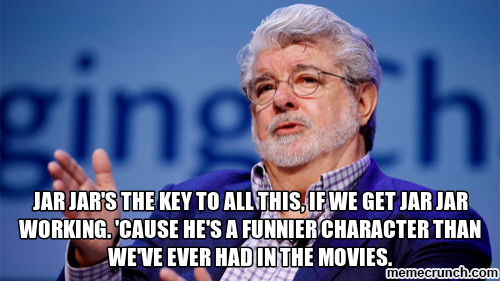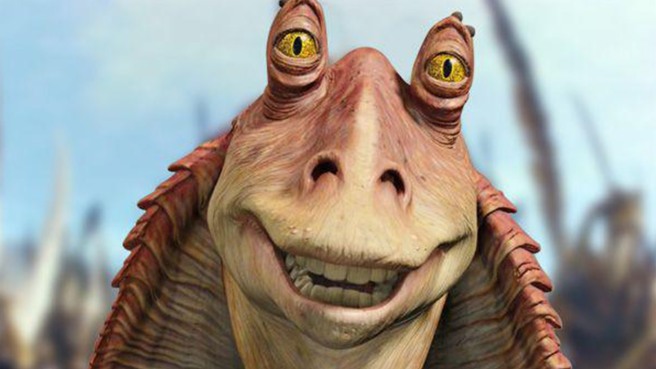
Most people who know me know that I am no fan of the Star Wars prequel trilogy. I bring them up quite a bit as negative examples, because they work so well as such. However, I’ve never actually said much about arguably its most hated character: Jar Jar Binks.
This is because, truth be told, there’s not that much I find wrong with him. Okay, one could make the argument he’s “racist,” as the character is a rather unflattering caricature of a Jamaican/Creole person. But I don’t see how it’s any more unflattering than C3p0’s portrayal of a British person. Nobody finds that offensive. I still don’t really see that much to complain about Jar Jar specifically as a character. Lots of characters can be offensive from a meta-textual perspective, and still be good characters. (Read Mark Twain sometime.)
As low as the bar for this is, Jar Jar has way more going for him than most of the other characters in The Phantom Menace. He’s probably the only character that has a distinct and recognizable personality in the entire film. Yes, he’s “stupid,” “clumsy,” and “obnoxious,” but these are all things you can actually describe — how do you describe Qui-gon, or Amidala, or Darth Maul? You can’t. Nothing about them is distinct. Darth Maul is known for his bad ass make up, but as a character, he has nothing to offer.
So then the question becomes:
Why do so many people pick on Jar Jar?
The answer is… Jar Jar is obvious.
And the truth is, the majority of what makes a movie work isn’t readily apparent just by looking at it. It is felt more than it is seen. None of that is to say Jar Jar is not annoying; he absolutely is. But so are so many other characters out there. What about Porky Pig? Or Donkey from Shrek? Or Beetlejuice? Or pretty much everyone in The Wizard of Oz? Or Luke Skywalker himself?
Well, it’s because those are from good movies. The Phantom Menace is a shitty movie. But a lot of people don’t necessarily have the knowledge and skill to explain why a movie isn’t working for them, so they point at something that’s obvious, and that everyone can see. We can see Jar Jar; we can see Jake Lloyd; we can see the awful CGI, etc. And while all of these may be worth complaining about as well, most of them wouldn’t be enough to ruin the movie on their own if the actual structure of the film was better. Jar Jar isn’t funny (to most people) because his entire purpose in most of the scenes he’s in is solely to be funny; he isn’t integrated into the story in a way that makes sense. So while Qui-gon is on one side trying to get parts for the ship, Jar Jar is over on the other getting into hijinks. Nothing connects up meaningfully.
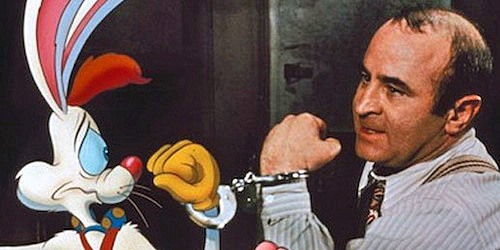
What makes an “annoying” character like Roger Rabbit funny is (1) how he is constantly conflicting with Eddie Valiant in new and hilarious ways, and (2) the fact that he is crucial to the plot of Who Framed Roger Rabbit? — you couldn’t just take him out of the movie because he’s literally the reason the movie exists. His name is in the goddamn title. You could take Jar Jar out of most of the scenes he’s in, and it would be the same movie. It’s not so much the voice or the mannerisms that make us hate Jar Jar; it’s just that he wasn’t structurally integrated well.
The bad application of structure is, in my opinion, the worst sin a movie can commit, and yet, it’s something almost nobody talks about. Everyone always talks about “originality” or “plot holes” or what have you, but I submit that all of those things are incidental. They may be true, but not actually the reason you did or didn’t enjoy it.
Structure is everything; it can, and often does, ruin entire movies if not done well. If a certain scene is wrong, then another scene somewhere else in the movie will not hit you the way it should. This doesn’t just apply to movies either, but to all art and design. The reason why a lot of people don’t like more avant-garde forms of music is because the don’t have the same sort of structure that a traditional pop song does; and it’s also why music snobs don’t like more mainstream artists like Marilyn Manson, because, although his music is aesthetically different, structurally, he uses a lot of the same paradigms that go back to classic rock like The Beatles.
Even now, writing this essay, I’m having a bit of trouble structurally transitioning to the next thought I’m trying to get to. I know I want to talk about action movies, but I’m not really sure how to get there in a way that feels natural. If I kept writing, I’d find it. But hopefully this proves I think about structure almost constantly when creating anything.
So… let’s talk about action movies, and why the ones from the 80s were usually more exciting than the ones they make now. One thing I’ve noticed is that, often, they would kill someone in the first five minutes to show that they weren’t fucking around.
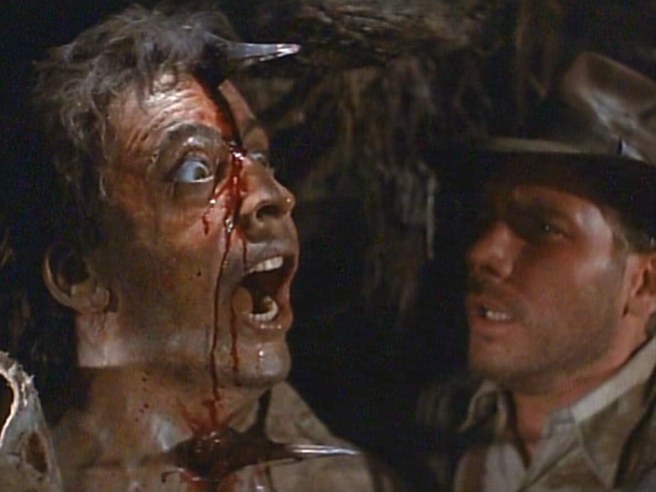
These crucial opening scenes establish the general “tone” and “rules” that the story is going to be abiding. If we know the movie is willing to show us this kind of violence, we have much more reason to feel afraid for Indy throughout all of his trials.
By contrast, the opening of Kingdom of the Chrystal Skull is this:
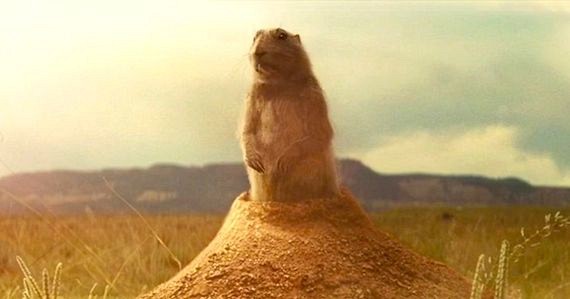
Not that that’s the only problem that movie has, but it sure as hell didn’t help. See how that works? The opening tells you what kind of movie you’re about to watch. If you opening sets up that the movie is going to be “cute,” then none of the danger from then on feels real. Movies that struggle with tone are ones that can’t stay on an even keel from what they establish in their openings.
Suicide Squad was a movie that failed so spectacularly to even communicate what kind of movie it was we were about to watch. It’s just a bunch of music videos, some of which feature torture, and others are more light-hearted. So, is it going to be comedy? Or a dark and gritty action movie? Even though the movie does recover a bit and end up being a good enough time to sit through, this bad start significantly hurts the movie (something I’m hoping the extended cut fixes).
By contrast, Guardians of the Galaxy perfectly establishes what kind of movie it’s going to be, just by the way it starts:
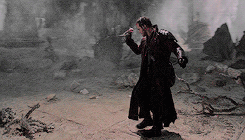
Once you see this, you know right away whether you’re going to like this movie or not, even if you don’t realize it. This is one of the many reasons Guardians is my favorite Marvel film. I wish they were all this good. Sadly, they are not.
I’ve often expressed my misgivings about Captain America: Civil War, and most people can’t seem to understand what I mean when I say that I feel like it lacked a certain degree of tension. It’s a different kind of movie from Guardians, and can’t get away with the same tameness. The action in Guardians is nothing special, but it didn’t need to be. It’s a comedy, not an action movie. But Civil War promised to be gritty and dramatic, and failed to be either. Oh sure, it’s a fun movie to boot. They got fun down pat. But it still wasn’t what it promised, and I could tell just by the opening sequence that we’d all been lied to. While the opening is a well-choreographed action scene that is exciting to watch, it also contains little to make me think that the movie is going to have the balls to put our characters in danger later on. Most of the injuries sustained are in shots like this:

There are two problems with this: 1. That guy is very obviously going to be fine. 2. Even if he wasn’t, we have no idea who he was and have no emotional investment in him. He might as well be a robot. What makes Satipo’s death from Raiders work is that we actually started to get invested in him in just the few short minutes he was on screen. Despite the fact that he betrays Indy and we’re sort of glad he dies, we still feel like we knew him. His death means something because it happened to somebody we recognize as a human being.
So while it’s not hard to see why a lot of people would find Civil War’s opening to be fun and exciting (because it is), for this story that movie is trying to tell, they needed to go a little more hardcore with it to make me really care about what was happening. Everyone walked out saying “Wow! Wasn’t that airport scene awesome?!” I walked out feeling pretty let down, because once you take away the good cinematography and Spiderman’s funny one-liners, you’re not left with much actual stakes to the scene. There’s never a point that I believed any of those people would kill each other, so there’s no reason to feel concerned about the outcome of the fight.
So what ends up happening is that this:
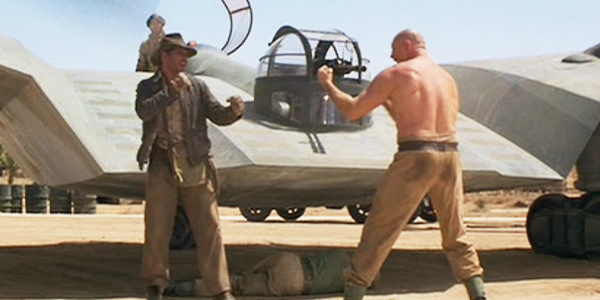
Is a million times more dramatic than this:
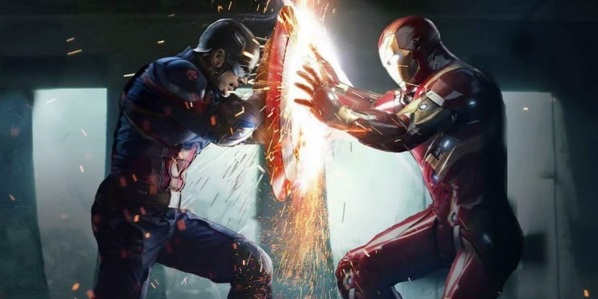
Their sense of fun and light-heartedness worked fine for their earlier films; Iron Man and Guardians of the Galaxy are still two great movies. But if you’re trying to make a super dramatic movie where I’m on the edge of my seat about what’s going to happen, then a little more grit is required — just like how Empire Strikes Back is a different tone than A New Hope. Different movie, different approach. Just because Civil War is fun doesn’t make it satisfying. It’s like eating potato chips: It tastes good, and makes you feel good, but you can eat them for hours and never feel full. Civil War puts you on an emotional high, but it doesn’t create any real catharsis.
I think the problem is that marketing in general is now so focused on what customers want out of their experience, much more than ever. We listen to our customers far more than we ever did in the 1980s. For a lot of industries, you can see how this is a good thing. But for movies, not so much. Since audiences can really only point at tangible details more than they can the underlying structure, asking why they liked or disliked it can yield incredibly deceptive results. And that’s not a slam against the average movie-goer; if your job isn’t to make movies, then not knowing how one works isn’t your fault. I don’t really know how my Smart Phone works; I just know that it is or isn’t doing what I want it to do. The software that drives it is a total mystery to me.
There’s actually a legit term for this, reverse-engineering: “The reproduction of another manufacturer’s product following detailed examination of its construction or composition.” And theoretically, there’s nothing wrong with that idea.
But again, if you’re only listening to people who don’t really understand movie-making, then most of what they’ll tell you is pretty damn useless, and trying to make movies based on this information usually doesn’t work that well. If they test a movie and get a bunch of people saying that it was “too dark,” they will reshoot half the movie and add in a bunch of scenes that are supposed to be comedic (Suicide Squad). If they say they liked the movie because it was dark, then they’ll try to make the next movie just as dark, because dark = what people want, supposedly.
BUT NONE OF THAT ACTUALLY MATTERS IF THE STRUCTURE OF THE MOVIE IS TOTAL SHIT!
Remember when Pirates of the Caribbean came out? What did studios glean from this? Put Johnny Depp in more things! Never mind the good direction, clever writing, and so forth; it’s Depp that people want, and it’s Depp they shall have!
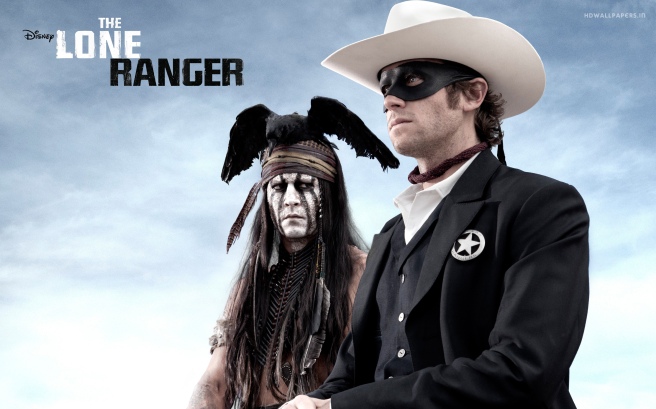
Oops…
None of this is to say that complaining about obvious details isn’t okay, since they can impact your ability to enjoy the movie as well. I just wrote a whole long article about my frustration with Hayao Miyazaki, which are all things that have nothing to do with the structure of the stories. But I acknowledge that these are pet peeves of my own and not actually things that make them bad movies. They just happen to be things that my personal taste prevents from fully immersing myself in those particular stories.
I could easily try to blame all of my problems with Civil War on the lack of logic in the plot, because it would be pretty damn easy to do. But it doesn’t have much to do with why I actually didn’t like it that much. I could easily say I love Empire Strikes Back because it’s “dark,” but that’s probably about 5% of the reason. I’m trying to get across here the importance of knowing the difference and not attributing a movie’s failure or success on the wrong thing, because I see far too much of that these days. And this is something George Lucas clearly didn’t understand when he uttered the famous words:
